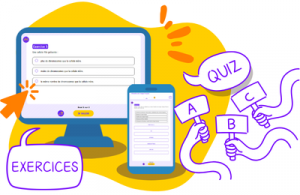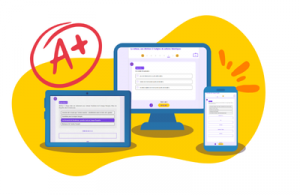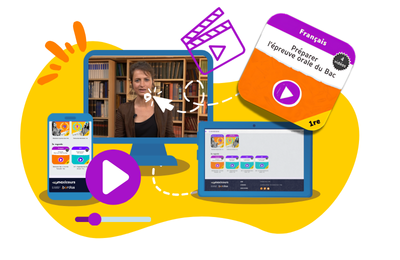Fahrenheit 451 (Ray Bradbury)
- Fiche de cours
- Quiz et exercices
- Vidéos et podcasts
- Connaitre les enjeux et les thèmes de Farhenheit 451.
- Connaitre la dystopie, un sous-genre de la science-fiction.
- Fahrenheit 451 est un roman de science fiction (plus précisément, une dystopie) écrit par l’américain Ray Bradbury en 1953. Le titre du livre fait référence à la température à laquelle le papier prend feu et se consume (451° Fahrenheit équivaut à 232,8° Celsius).
- Le roman développe l’histoire de Guy Montag, un pompier qui sauve des livres des flammes, dans une société qui les considèrent comme dangereux.
- Le roman aborde des thèmes comme l’oppression et la censure.
- Il convoque dans l’esprit des lecteurs les images des livres brûlés par les Nazis durant la Seconde Guerre mondiale.
Fahrenheit 451 is a dystopian science fiction novel written by the American author Ray Bradbury in 1953. The main character is a man called Guy Montag. He is a fireman who also loves books in a society where books have been banished and firemen are charged with burning those they find. The place Montag lives in, a futuristic American city, is oppressive and its inhabitants have lost the sense of positive values such as reading, enjoying nature, meeting people or thinking by themselves. And a war is looming…
At the beginning of the novel, Montag meets a young girl named Clarisse. She is different – she loves people and nature – and asks questions that make Montag realize how empty his life is. Dissatisfied with his life, he tries to find solutions in the books he steals from the houses he has been into to put out fires. But as books offended readers, they were soon forbidden, and Montag has to keep them hidden. When Beatty, Montag’s chief, knows that he has some books at home, he does not denounce him, but he tells him to read them, and if there is nothing interesting inside, he should burn them. There are so many books to read that Montag asks Faber, a retired English professor, to help him as Mildred, his wife, refuses to read. Indeed, she prefers watching television and she simply does not understand why her husband takes so many risks. Faber will contact a printer to have the books reproduced while Montag will hide books in the homes of firemen to discredit the profession and to stop censorship. But soon, Montag is betrayed by Mildred who calls the firemen in order to denounce her husband. Trapped, Montag has to set his own house on fire. As Beatty decides to arrest Montag, the latter uses his flame thrower against his superior and kills him. Then, he collects some books hidden in the back yard and flees. On his way, he comes across a group of vagabonds who are also book lovers. They welcome him. As the war has just begun, the group decides to find survivors and rebuild civilization.
Ray Bradbury explains that he decides to entitle his book Fahrenheit 451 (232,8° Celsius) because “at 451° paper catches fire and burns. So it was only natural that I sat down and wrote Fahrenheit 451.”
Dystopia is the contrary of utopia. A dystopia is a terrible place where a disastrous future is imagined, where oppression is omnipresent and where social order is maintained through fear. In the novel, the characters reject the book because it could betray them and consequently, nobody has the right to find pleasure in literature, which is considered as subversive. Censorship is also a recurrent theme in dystopian novels. In the novel, the television has replaced the book because it does not lead people to think and people cannot express personal freedom.
The book was written after World War II and reminds the readers of the terrible book burning that took place in Nazi Germany in 1933. To Ray Bradbury, books are part of ourselves, they have a major role to play and people must be aware of that. Getting rid of books is one of the most important errors humanity can make. We owe a lot to literature, books teach us so many beautiful things that we must protect them.

Des quiz et exercices pour mieux assimiler sa leçon
La plateforme de soutien scolaire en ligne myMaxicours propose des quiz et exercices en accompagnement de chaque fiche de cours. Les exercices permettent de vérifier si la leçon est bien comprise ou s’il reste encore des notions à revoir.

Des exercices variés pour ne pas s’ennuyer
Les exercices se déclinent sous toutes leurs formes sur myMaxicours ! Selon la matière et la classe étudiées, retrouvez des dictées, des mots à relier ou encore des phrases à compléter, mais aussi des textes à trous et bien d’autres formats !
Dans les classes de primaire, l’accent est mis sur des exercices illustrés très ludiques pour motiver les plus jeunes.

Des quiz pour une évaluation en direct
Les quiz et exercices permettent d’avoir un retour immédiat sur la bonne compréhension du cours. Une fois toutes les réponses communiquées, le résultat s’affiche à l’écran et permet à l’élève de se situer immédiatement.
myMaxicours offre des solutions efficaces de révision grâce aux fiches de cours et aux exercices associés. L’élève se rassure pour le prochain examen en testant ses connaissances au préalable.

Des vidéos et des podcasts pour apprendre différemment
Certains élèves ont une mémoire visuelle quand d’autres ont plutôt une mémoire auditive. myMaxicours s’adapte à tous les enfants et adolescents pour leur proposer un apprentissage serein et efficace.
Découvrez de nombreuses vidéos et podcasts en complément des fiches de cours et des exercices pour une année scolaire au top !

Des podcasts pour les révisions
La plateforme de soutien scolaire en ligne myMaxicours propose des podcasts de révision pour toutes les classes à examen : troisième, première et terminale.
Les ados peuvent écouter les différents cours afin de mieux les mémoriser en préparation de leurs examens. Des fiches de cours de différentes matières sont disponibles en podcasts ainsi qu’une préparation au grand oral avec de nombreux conseils pratiques.

Des vidéos de cours pour comprendre en image
Des vidéos de cours illustrent les notions principales à retenir et complètent les fiches de cours. De quoi réviser sa prochaine évaluation ou son prochain examen en toute confiance !








